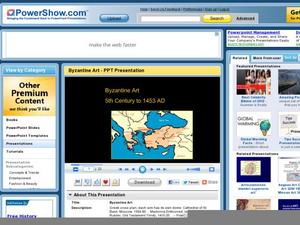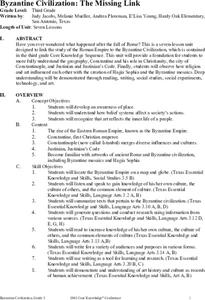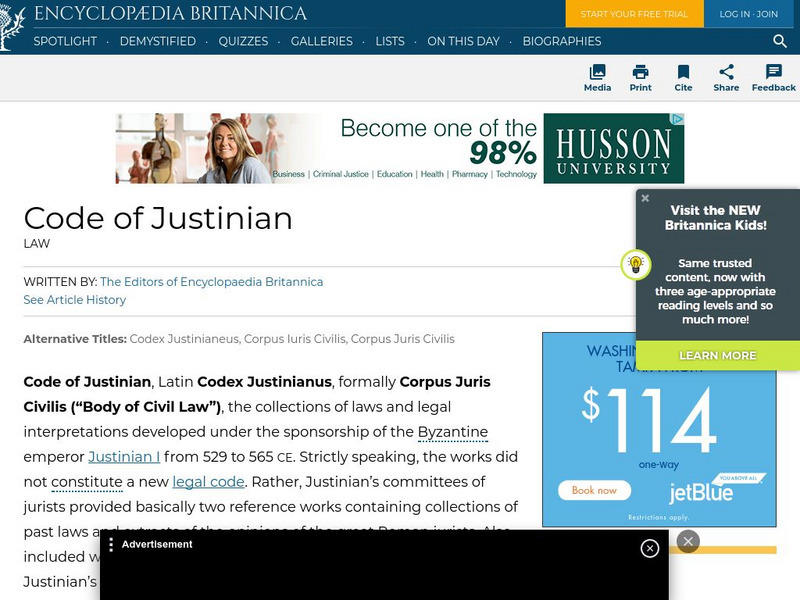Curated OER
Justinian I
Students research emperor Justinian I in this activity. They identify the contributions of Theodora to Justinian's rule, and the expansion of the Byzantine Empire during this time. They then analyze the contributions of Byzantine on...
Curated OER
Writing Exercises: The Byzantine Empire I
Boost expository writing skills while testing content understanding. Here are three short essay questions intended to activate learner comprehension of concepts related to The Byzantine Empire, shifts in Roman law, and geographical...
Curated OER
Byzantine Art: 5th century to 1453 AD
Art and architecture are great ways to help define historical periods and cultural norms. Take a critical look at the art of the Byzantine period as seen under Justinian rule. Iconography, vocabulary, religious, and political concepts...
Curated OER
Introduction to the Byzantine Empire
Students research the founding of the Byzantine Empire in this lesson. They examine the geographic advantages of Constantinople, and the establishment of the empire. Finally, they compare the Byzantines, Romans, and present-day...
Curated OER
The Influence of The Byzantine Empire on Russia and Eastern Europe
Students examine the influence on Russian and Eastern European language, religion, art, and architecture by the Byzantine Empire. They define key vocabulary terms, listen to a lecture and participate in a class discussion, and label a map.
Curated OER
The Sarantine Mosaic: Fiction and History
Be sure your readers understand The Sarantine Mosaic with this quiz. Multiple-choice but still detailed, the assessment provides answers once it is submitted online. Make sure learners have finished reading before they take this quiz or...
Curated OER
Byzantine Civilization: The Missing Link
Students connect their study of the Roman Empire to their study of the Byzantine Civilization. In this ancient history lesson, students study the time period between the fall of the Roman Empire and the rise of the Byzantine.
Curated OER
Byzantine Empire
In this history instructional activity, high schoolers find the words related to the Byzantine Empire and the answers are found at the bottom of the page.
Encyclopedia Britannica
Encyclopedia Britannica: Code of Justinian
In this entry, you will discover how Justinian I comprised past laws extracts of the opinions of the great Roman jurists, turning it into the Corpus Juris Civilis, otherwise known as "Body of Civil Law." The Justinian code consists of...
Other
Lectures in Medieval History: The Reign of Justinian, 527 565
Read a brief overview of the reign of Justinian I, his decisions about reuniting the Roman Empire, and the beginning of the Byzantium Empire. Two maps show the Mediterranean world in 565 and 600.
Ducksters
Ducksters: Biographies for Kids: Justinian I
Explore the biography of Justinian I from the Middle Ages. Learn about the Emperor of the Byzantine Empire and established the Justinian Code.
Other
History of Information: The Code of Justinian
Learn here how the codification of law in Rome became known as the Code of Justinian (named after Emperor Justinian I). This code became the basis for civil law in western Europe.
University of California
University of California at Berkeley: Justinian Code
This website describes the creation and implementation of the Justinian Code, or "The Body of Civil Law" for the Roman Empire. The site is divided into sections, including a description of the code itself, the type of laws within it,...
Internet History Sourcebooks Project
Fordham University: Medieval Sourcebook: Procopius: Secret History, Extracts
Fordham University offers extracts from the "Secret History," written by Procopius, describing the dark side of Justinian's rule.
Able Media
Ctc: I, Caesar a Study of the Imperial Romans
This lesson plan provides semester-long activities in which students research and write about selected emperors who ruled Rome during different parts of its history.
Khan Academy
Khan Academy: Key Concepts: The Byzantine Empire
The resource from Khan Academy provides practice questions for a high school world history course. This section assesses students' knowledge of the Byzantine Empire.

















